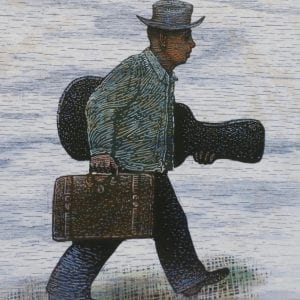Migration, Sounds, and the History of Chicago Blues
Author: Santiago De Zubiría
Program of Study: Master of Public Policy (MPP), Harris School of Public Policy (HAR)

The Great Migration Blues. (Source: https://8tracks.com/jujubeezie/the-great-migration-blues)
Description: In this episode, Santiago talks about the Chicago Blues and how exploring its history can help us to understand the relationship between migration and music. During the Great Migration caused by segregation, poor conditions, and the Jim Crow laws, African-American people arrived in the northern urban areas of the United States, changing the sounds they were using to express the blues, and laying the foundations of Chicago Blues.
Listen here:
Transcript (provided by author):
(Music intro)
Welcome to the ELI’s Finding Chicago Global Perspectives Podcast Series for AEPP 2022. I’m your host, Santiago De Zubiría, currently enrolled in the University of Chicago’s Harris School of Public Policy. Today we are going to talk about the history of Chicago blues and how the Great Migration affected the sounds of blues.
(Music)
I chose this topic because I’ve played blues and jazz for 15 years in my home country, Colombia. And I love to dig into the history of music, the history of the sounds, the people, and the instruments used to produce those sounds. But Colombia doesn’t have a historical relationship with the blues. So, for me, living here, in the country of blues, in the middle of the city that saw the birth of a sub-genre of blues, the Chicago blues, is pretty cool. It’s an excellent opportunity to explore the roots of the music that I love.
First, we will make a little bit of the migration history here. Back in the ’30s, Chicago’s African-American population was confined to a tiny area known as the Black Belt in the south of Chicago. According to the Jazz History Tree, from the ’30s to the ’50s, Chicago’s African-American population multiplied by 7, and that demographic explosion marked the beginning of the Chicago blues.
That is interesting because that migration was caused by discrimination and segregation in the southern states. More than 6 million African-Americans migrated to the north, escaping the Jim Crow laws and looking for better working and social conditions. So, unfortunately, many laws created a legal ecosystem that pushed to the north, to the urban areas of the north, a culture that was the core of an emerging genre, the blues.
Because the roots of blues are the African-American work songs of the cotton fields, and with the Great Migration, those rural sounds of the Mississippi blues entered many cities, including Chicago. And the blues absorbed the sounds of the city. The sound of the steel. The sound of metallic tools, the sound of electronic devices, of the distortion caused by electronic devices. Have you ever listened to a city? Because we are used to going to the countryside to enjoy the sounds of nature, closing our eyes, but cities have particular sounds too.
(Chicago Sound)
Think about how these sounds, the sounds of a bustling downtown like Chicago’s, how these sounds can affect the production of musical sounds. And I’m not talking about modern musical experiments, recording the subway sound and sampling that into a song. It is just an invitation to feel and understand how people migrating from the countryside experienced the city and how their music incorporated some of that sounding experience.
So, they left behind the soft and handcrafted sound of acoustic guitars and the raw and more expressive voice of the Mississippi blues linked to the work songs. They began to use electric devices and electric guitars with distortion and effects, adding drums and electric bass to the band.
To understand that change, Marcia Friedman, on BLUES 102, recommends us to hear Muddy Waters’ Country Blues, the 1942 song, and then Mannish Boy, released in 1955. Here you can listen to the evolution of one musician from the delta blues style to the Chicago blues style. I cannot play it here because of the copyright, but go and listen to those two songs, and you will be surprised that they are not different groups… That is only the effect of migration on how Muddy Waters expressed his music. And this effect was amplified by the influence of the Chicago Blues. These musicians not only influenced the development of early rock and roll, …you know, like Chuck Berry, but also blues-rock and the British blues, including Led Zeppelin, Eric Clapton, and the Rolling Stones.
I’m recording this a day after going to a fantastic Eric Clapton concert at the United Center, home to the Chicago Bulls. And if you pay attention to Eric Clapton’s sound, you’ll find many of the elements we explored today, and he has said many times that Muddy Waters is one of its major influences. You still have a chance to see Jeff Beck next month, here in Chicago, a bandmate of Eric Clapton and Jimmy Page, in The Yardbirds. Great band.
Ok, well. This topic is so incredible to me. And I can stay here all day talking about different songs and contrasting the delta blues sound with Chicago blues. There are too many examples of this evolution. But today, that wasn’t the purpose. I just wanted to intrigue you about this exciting relationship between migration and music and how political and societal changes can affect the evolution of music.
I hope this podcast will enrich the way you live in the city. The next time you take the Metra or CTA lines, you will probably be thinking about how rural African American musicians lived- their forced entry into the city of Chicago and how they incorporated that change by producing different sounds and expressing themselves with an urban style.
(Low music)
I hope that all of you enjoyed this podcast; I hope you’ll find it helpful, and thank you so much for listening to me.
(Music)
Leave a Reply
You must be logged in to post a comment.